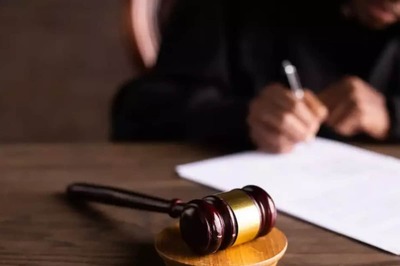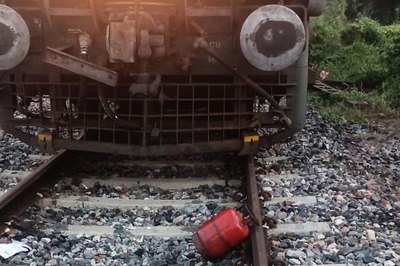
views
India awaits its vote on account and everyone has been evaluating tenure of the outgoing Government. BJP's former Finance Minister Yashwant Sinha has given a negative rating on the UPA Government's stint. However, Surjit Bhalla of Oxus Investment is positive on the Government's performance.
BJP's former finance minister Yashwant Sinha is of the view that Indian economy faced double-digit inflation early last year and in order to get over that problem, the Government adapted a very tight money policy. “It didn't have any impact on Inflation as that was related to essential commodities which are still in double-digits but it had an impact on consumer and investment demand. As a result, money not only became scarce it also became unaffordable and resulted in the Indian economy slowing down.”
Chairman Oxus Investments, Surjit Bhalla, said over the last five years fiscal deficit has consistently been coming down, which suggests that the Government has been quite responsible on the fiscal side.
Director General National Council of Applied Economic Research, Suman Berry, feels the Government has been doing more on infrastructure. He is glad the Government has stuck with the PPP (Public Private Partnership) model. However, he feels implementation and inter ministerial issues could have been better managed.
Here is a transcript of the exclusive interview with Suman Berry and Surjit Bhalla on CNBC-TV18.
Q: Let's start with the economic crisis, the current situation in India today, how serious would you say it is?
Sinha: I say it's a very serious crisis because it's a mix of two types of crisis, one is the crisis of our own creation in India and the other is the crisis that we are facing globally which is well known but the crisis created by us by our own policies has been not commented upon so much as it would have brought it to public domain in a very strong way.
Q: What are the particular policies you believe which have added to this crisis?
Sinha: We faced raised inflation early last year and in order to get over that problem, the Government adapted a very tight money policy. This came in the wake of huge unprecedented fiscal deficit which hurt the Government of India's budgets and the state budgets which had already appropriated much of the liquidity in the system. The result was that it didn't have any impact on Inflation because inflation was related to essential commodities which are still in double digits but it had an impact on consumer demand, investment demand. As a result of the fact that money not only became scarce it also became unaffordable. So that has resulted in a slowdown of our own creation as well as the Indian economy.
Q: Would you accept that the Government's monetary policy has added to the problems?
Berry: You can say this with 20-20 hindsight but its fair to say that there was a consensus throughout the country that inflation was the issue indeed throughout the world that inflation was the issue at that time and all the global institutions were saying this, don't you think you are being just a little harsh?
Sinha: You look at the stage at which the Government and the RBI came out with their tight monetary policy this was well before the WPI on a monthly basis touched 8 per cent. I remember the Congress spokesperson saying that it had touched 8 per cent even when I was the Finance Minister and I was being criticized for it, you will recall that the RBI at my time didn't adapt a tight money policy when inflation had touched 8 per cent for the simple reason that we knew that it was the result of increase in petroleum product prices which the Government had introduced. Therefore my prescription even at that point and its not post facto, was if you take monetary steps or if you tighten liquidity or if you make money scarce then it may not have any impact on demand in elastic food grains or essential commodities but it certainly has an impact on consumer and investment demands.
Q: Would you accept that?
Bhalla: On inflation as well as monetary policy, I happened to be in broad agreement with what you are saying that we tightened, and too quickly etc but I want to pick up on the second issue. On the fiscal side that actually if we look at the performance of this administration over the last five years that the fiscal deficit until this most recent year has consistently been coming down and therefore it suggests that the Government has been quite responsible on the fiscal side and if you now take 2008-09 as a benchmark of spending too much etc, there isn't a single country on this planet which isn't going through the same kind of problems, so if I were to judge the Government on its fiscal side, its performed remarkable well but on the monetary side and that's my follow up question that we have this independence of the central bank, so what extent is it the case that the Government is responsible for some of the missteps of the RBI.
Q: Can you specify which the particular missteps are or do you think some of them are worth identifying?
Sinha: The steps are very clear, you raise CRR, you suck out liquidity from the system, and you raise SLR, you force banks and institutions to raise interest rates then you are creating a situation in the market which is full of difficulty for the future. Lets not forget the other point that I made that this happened in the wake of unprecedented fiscal deficits run by the Government of India in the current fiscal year and I am not nearly referring to the fiscal deficit in the budget represented or not represented and reflected or not reflected. I am also referring to off budget liabilities like issuance of oil and fertilizer bonds, food bonds etc which have impacted on the liquidity situation in the market.
Q: Which are the bits of that answer you disagree with?
PAGE_BREAK
Berry: It's not a question on disagreement but I just want to drill a little bit deeper, there is a question that Mr. Bhalla put to you which is that do you hold the RBI or the Government accountable and were you to return to power based on what you have seen over the last 18 months, would your party's platform be for more or less Central Bank independence? The second issue is the whole world now believes that you don't need to worry about the fiscal deficit, so they may have been right for the wrong reason but given the depth of the crisis, have they done the right thing for the wrong reasons?
Q: Answer first the question if you were to come to power whether you would give the Central bank more or less independence?
Sinha: When I was the Finance Minister, I would dare to say that we had ensured the highest degree of autonomy for the RBI but at the same time I would say that there is nothing which prevents the RBI Governor and the Finance Minister from getting on well with each other. They need not be working at cost purposes, the impression which I caught during the last five years was as if the RBI governor and the Finance minister were working at cross purposes and let me share the secret with you, if Bimal Jalan as the Governor of the RBI came to me and discussed his monetary policy issues in a friendly manner and without getting impression that I was weighing heavily on him and I went to him and I discussed with him budgetary issues with which he may not have been directly concerned and we weren't in pinching on each others autonomy we were just consulting each other as friends
Monetary policy alone was not the answer for that kind of situation that we faced we needed a number of supply side measures as the Prime Minister's Economic Advisory Council itself has pointed out in its repeated reports and those supply side measures were not taken adequately enough in a timely enough manner by the Government, so that is where I would hold the Government responsible but as far as monetary policy is concerned, yes it's the RBI as there should be some consultation.
Q: Has the Government been lucky for the wrong reasons?
Sinha: I don't think so I would like to make one point to Mr. Berry, the European and US Nations have billions of dollars on subsidies. We have a huge headroom available as far as agricultural subsidies are concerned, it's a question of affordability it might be possible for the US administration whether Mr. Bush or Obama to come out with a $ 3 trillion to revive the economy but is that the choice available to India. If I were asked to decide as a fiscal purist and I will not agree that you leave an overhang of about 14-15 per cent national deficit on the country when you quit office and that's not acceptable.
Q: How do you respond as an economist to this?
Bhalla: I completely agree with Mr. Sinha on his comments on monetary policy and the conduct of monetary policy as to how it has faltered over the last several years and I really do disagree on the fiscal deficit and lets give credit where it is due, this Government has managed the fiscal side very well and has mismanaged the monetary side rather badly.
Q: What about you?
Berry: My view is the opposite, which is why I do think that I am in an agreement with Mr. Sinha that given our high debt level I have to say that it was high even when the Government took over. It came down but it still remains high that we do need to worry about fiscal and I do think that has been a part of the Government's plan and on the monetary as I say I am willing to give and cut the Government a bit more of a slag in light of what they knew at the time.
Q: If in three months after the next election you happen to be in the hot seat as the next Finance Minister of India. What steps will you take that you believe are essential to tackle the economic crisis?
Sinha: Whether I am in that hot seat or not because that hot seat is eminently avoidable. I would like to say as an independent observer of the scene that there are three-four things which any Government should do: (1) this Government, any Government should spend the budgetary allocation on infrastructure, on productive items of expenditure. There is no reason why the National Highway Programme should have been in such doldrums, there is no reason why the Pradhan Mantri Gram Sadak Yojana should not be making progress. These are criminal negligence and should not be allowed (2) I will not burden the Government's budget with any of the economically viable schemes which can be run for e.g. if Delhi-Mumbai rail freight corridor is a viable scheme with a good internal rate of return then I will say form an SPV (Special Purpose Vehicle), take it out in the Budget, go to the market, raise money, implement the project (3) I will start implementing with some Government help the interlinking of rivers projects that the NDA (National Democratic Alliance) Government had left behind (4) I will bring down the rate of inflation a level where we can play around with interest rates and once again make interest rates so attractive that people will start spending money and start buying so that there is fillip to the economy. These are steps which come to my mind immediately.
PAGE_BREAK
Q: The first three things that Mr. Sinha spoke about were all in one sense or another infrastructure or river related. Inflation and the handling of inflation came in at number four. How do you comment on that priority?
Bhalla: First let's do the inflation side: As you know inflation right now in India is close to 0per cent so our inflation rate is already way down; there isn't much one can do to bring it down further. I do not think it's advisable to get the inflation rate down to negative territory. So given that it is at these levels and is expected to stay at these levels and we will work with that assumption. Let's take the broad monetary policy indicators – repo rate - where do you think you would like to see the repo rate given that we are in a growth slowdown and the fact that basically inflation is an ex-issue.
Q: Where do you like to see the repo rate?
Sinha: I have been written articles written by Surjit Bhalla about how he looks at inflation and I will say respectfully that I disagree with him because as I mentioned earlier in this programme there is a rate of inflation and all consumer items essential commodities are still in double digit. But be that as it may. I would say the repo rate should be reduced drastically according to a roadmap which the RBI should announce and the investor, the person who is saving money should know where we are headed.
The problem is we do not clearly state what our objectives are, we do not layout a roadmap and that's what creates confusion and difficulty.
Q: The first three points that were made by Mr. Sinha were all in one sense or other to do with infrastructure and many people believe that ignoring infrastructure or not putting enough effort into it is the great presetting scene of this Government. Do you think what Mr. Sinha is talking about is a good, useful and needed corrective?
Berry: I agree with him that the Government have been doing more on infrastructure by this stage. I think the fact that they stuck with the PPP (Public Private Partnership) model has been good but I think the implementation and inter ministerial issues that those have raised could have been better managed. But I just want to ask you (to Sinha) – Having been a Governor for the World Bank and the IMF (International Monetary Fund) for India – how seriously do you take the invitation to India by the G20? What is it that you think can be done? What is it that you would do to use this opportunity to get India a seat at the top table or do you think that this is just a short-term trick and that the G7 will go back to running the world economy in the way that suits them the moment the crises eases?
Sinha: Suman you know that G20 was formed when I was the Finance Minister and the Governor on the board. You also know that I was the second Chairman of G20 after the Canadian Finance Minister. I think India can play a very important role in G20. I think IMF still is in need of great deal of reform and the IMF should be able to discipline all economies and not merely the poorer economies, the developing country economies and we should decide that role for the IMF. The G20 should replace the G7 and become the arbiter of the destiny of the global finance and economy.
Q: Do you think that it makes sense what you are hearing?
Berry: I think it will take a lot of work and I do not think there is enough of a debate in these issues unlike the WTO (World Trade Organization).
Bhalla: I think very likely to succeed. I do not think the G7 can, will or should go back to their own ways; they have recognized it and I think this is India's turn and Asia's turn to be involved in the events of the world economy.

















Comments
0 comment